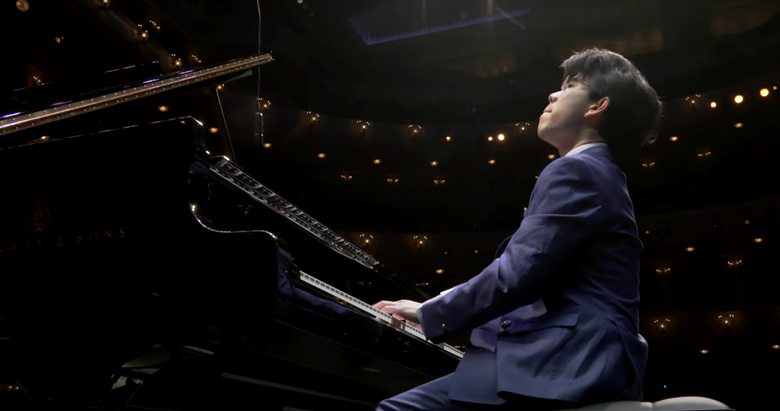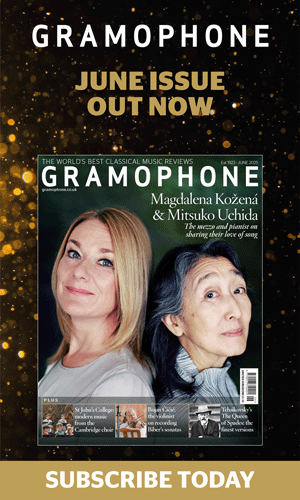Jed Distler's Cliburn Blog No 10: Off Again and On Again
Jed Distler
Saturday, May 31, 2025
'Aristo Sham displayed a sensitivity and genuine collaborative spirit throughout the A major Concerto, K488'

Before discussing Friday’s performances, I should remind readers that I’m currently reviewing from The Cliburn’s livestream, where the clear and close-up sonic perspective apparently contrasts to Bass Performance Hall’s resonant ambience. All the more reason that I look forward to covering the Finals in person from Fort Worth.
So far I’ve waxed ‘off again, on again’ about Yanjun Chen, between her bland Mozart and Debussy and impassioned Shostakovich and Medtner. At least her Preliminary and Quarter-final recital choices constituted fresh programming. Not so her Semi-final selections. A lethargic tempo rendered the Chopin Ballade No 2’s barcarolle-like theme dead on arrival, in contrast to the vibrant agitated sections. The E major Étude, Op 10 No 3, featured more than a few swan dives in the name of ‘expression’. She applied the same generic ‘one size fits all’ speed-ups and slow-downs in Ravel’s Jeux d’eau. Lastly Chen teetered between brutal and boring throughout Schumann’s Kreisleriana. She pounced on the first movement, accenting each downbeat so that no dullard would miss the point. The beautiful (if arguably overlong) second movement further demonstrated Chen’s habit of hesitating before iterating the final note of a long lyrical phrase, whether or not the composer asks you to do so. She set an optimistically fast pace for the seventh movement, resulting in a couple of battle scars and further pounding. And by pushing ahead in the final movement, Chen undermined the music’s mysterious subtext and the unsettling impact of the syncopated bass notes. In all, sad to say, a disappointing recital.
By contrast, Evren Ozel displayed finished sheen and stylistic sensitivity throughout his Semi-final set. Although his fast tempo for Liszt’s Les jeux d’eaux à la Villa d’Este conveyed a perfunctory impression, Ozel’s shapely and colourfully variegated arpeggios compensated. Perhaps he was treating the Liszt as a warm-up for Ravel’s Gaspard de la nuit, where the pianist comfortably settled into ‘Ondine’s comparable textures. As the cliché goes, time stood still when Ozel played ‘Le gibet’; where his control of sonority, micro-shadings of nuance, and natural musicality all coalesced. I suspect that a slower tempo for ‘Scarbo’ would have elicited more colour and character from Ozel’s fingers, but, my goodness, what fingers! An adrenaline rush also prevailed in the first movement of Beethoven’s Sonata, Op 111, where many of the composer’s important subito dynamics and contrapuntal complexities fell by the wayside. Only in the Arietta’s ethereal chains of trills did a sense of repose prevail. Still, Ozel has a genuine feeling for this work, and I imagine he’d present a more balanced interpretation in less pressured circumstances.
An inconsistent Mozart Concerto evening was in store for in person and online music lovers. It started with a terrific first half, where Aristo Sham displayed a sensitivity and genuine collaborative spirit throughout the A major Concerto, K488. You only have to have heard the imitative phrases seamlessly pass between the pianist and the woodwind soloists in the Rondo Finale to perceive this attractive aspect of Sham’s musicianship. If anything, Carlos Miguel Preito and members of the Fort Worth Symphony provided more involving support for Sham than they had for Vitaly Starikov on Thursday.
Don’t expect tragic undertones and a brooding demeanor from Elia Cecino’s C minor Concerto, K491, in the manner of András Schiff or Alfred Brendel. Instead, revel in his red-blooded sonority, operatically oriented phrasing and open-hearted outer movements. The music can take it, and, besides, didn’t Arthur Rubinstein offer this brand of healthy Mozart? So many young pianists put this composer on a pedestal and micromanage details to death. Evidently not Elia Cecino!
The second half convinced me less. Despite some lovely cantabile detailing in the slow movement of the B flat Concerto, K595, and a good lilting tempo for the Rondo, Piotr Alexewicz’s curvaceous diminuendos and over-pointed crescendos elsewhere seemed clever for the sake of being clever. Moreover, his pretentious gesticulations and tendency to conduct with whichever hands were otherwise unoccupied were distracting to watch.
The poise, discipline and immense preparation informing all of Yangrui Cai’s performances over the competition’s course were again present in Mozart’s C major Concerto, K503. But the warmth, the humour, the singing impulse and joy in music-making that we heard from Aristo Sham and Elia Cecino in the first half seemed lacking. It’s hard to pinpoint my response in words. Perhaps it’s that Cai doesn’t characterise the different themes so distinctly as he should, or make the most of transitional bridges? Or maybe that some of the pickups and instances of ensemble/soloist dovetailing in the slow movement didn’t effortlessly ‘lock in’? Or possibly the rather brittle sound of his loud chords? Incidentally, Cai played a long and rather garish yet not uninteresting first-movement cadenza composed by Kenny Broberg, winner of the 2021 American Pianists Awards.
Overall, I respect Cai’s integrity and his workmanship, and who wouldn’t? Yet why haven’t I been moved by his music making so far? Obviously I’m missing something, because you don’t advance to the Semi-finals for nothing. And at least I’ll get to hear Cai in person, should he make the Finals. We will see.
Gramophone is a Media Partner of The Cliburn International Piano Competition

















